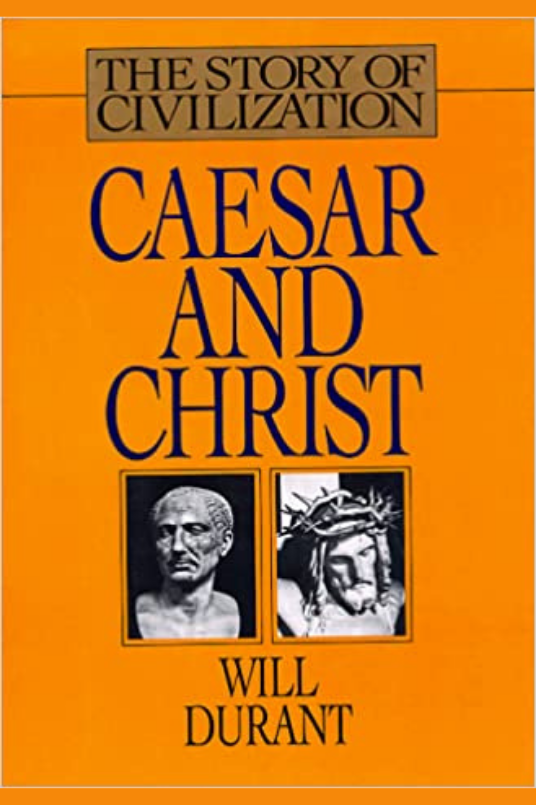I’d recommend starting with his smaller books and if those get you curious, then dive into the series.
It takes a while to read. The books are dense. There is A LOT of detail about MANY topics. Yet, it’s worth it if you are curious about history and want to have a good overall understanding.
My goal is to read the whole series of 11 books. I’m already on book 4 and it will likely take a few more years to finish.
Flow: 3/4
Actionability: 3/5
Mindset: 5/5
Some of My Highlights:
“Contentment is as rare among men as it is natural among animals, and no form of government has ever satisfied its subjects.”
“Obligations went with these privileges. The citizen, unless quite poor, was liable to military service at call from his sixteenth to his sixtieth year; and he could not hold political office until he had served ten years in the army.”
“The Romans recognized that in times of national chaos or peril their liberties and privileges, and all the checks and balances that they had created for their own protection, might impede the rapid and united action needed to save the state.”
“The Roman constitution rested finally on the most successful military organization in history.”
“A legion was a mixed brigade of some 4200 infantry, 300 cavalry, and various auxiliary groups; two legions made a consul’s army.”
“The major element in the success of this army was discipline.”
“Aristotle praised the constitution of Carthage as ‘in many respects superior to all others,’ for ‘a state is proved to be well ordered when the commons are steadily loyal to the constitution, when no civil conflict worth speaking of has arisen, and when no one has succeeded in making himself a dictator.”
“He had disciplined his body to hardship, his appetite to moderation, his tongue to silence, his thought to objectivity [Hannibal].”
“Hannibal preferred death to capture. ‘Let us,’ he said, ‘relieve the Romans from the anxiety they have so long experienced, since they think it tries their patience too much to wait for an old man’s death.'”
“Birth itself was an adventure in Rome. If the child was deformed or female, the father was permitted by custom to expose it to death.”
“Nevertheless, the old religion made for morality, for order and strength in the individual, the family, and the state. Before the child could learn to doubt, faith molded its character into discipline, duty, and decency.”
“The Roman of those centuries had little need of medicine, for his active life in farming or soldiering kept him healthy and strong.”
“The business of vote buying reached a scale where it required a high specialization of labor: there were divisores, who bought votes, interpretes, or go-betweens, and sequestres, who held the money until the votes had been delivered.”
“When he discovered the writings of Epicurus it seemed to him that he had found the answers to his questions; that strange mixture of materialism and free will, of joyfully gods and godless world, appealed to him as a free man’s answer to doubt and fear.”
“Death itself is not terrible; only our fears of the hereafter make it so. But there is no hereafter. Hell is here in the suffering that comes from ignorance, passion, pugnacity, and greed; heaven is here in the sapientum templa serena-‘The serene temples of the wise.'”
“Rich men had clerks who copied for them any book they wished to own. Since copyists were fed rather than paid, books were cheap. First ‘printings’ were usually of a thousand copies. Booksellers bought wholesale from publishers like Atticus, and sold at retail in arcade bookstalls. Neither publisher nor bookseller gave the author anything except courtesy and occasional gifts; royalties were unknown.”
“In Rome history was an art, neve also a science; not even in Tacitus did it rise to a critical scrutiny and summary of sources.”
“‘You have discovered the treasures of oratory,’ said the generous Caesar in dedicating his book On Analogy to Cicero; ‘and you have been the first to employ them. Thereby you have laid the Roman people under a mighty obligation, and you honor your fatherland. You have gained a triumph to be preferred to that of the greatest generals. For it is a nobler thing to enlarge the boundaries of human intelligence that those of the Roman Empire.”
“The assassination of Caesar was one of the major tragedies of history.”
“Caius Octavius, who was to make himself the greatest statesman in Roman history, was eighteen years old in 44. By natural custom he took his adoptive father’s name; adding his own as a modifier, he became Caius Julius Caesar Octavianus, until, seventeen years later, he received that lofty name of Augustus by which the centuries have known him.”
“The boy was trained to Spartan simplicity, and educated in the literature and philosophy of Greece and Rome [Augustus].”
“All Italy and all the provinces acclaimed him as Plato’s dream come true: the philosopher was king [Marcus Aurelius]… He was a philosopher king in the Stoic rather than the Platonic sense.”
“Only a man schooled in the Roman and Stoic sense of duty could have transformed himself so completely from a mystic philosopher into a competent and successful general [Marcus Aurelius].”
“From Egypt came the ideas of a divine trinity…”
“Christianity was the largest creation of the ancient pagan world.”
“Christ himself attributed his cures to the ‘faith’ of those whom he healed…”
“He resembled Caesar only in taking his side with the lower classes, and in the quality of mercy… Caesar hoped to reform men by changing institutions and laws; Christ wished to remake institutions, and lessen laws, by changing men.”
